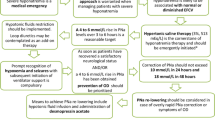Abstract
Hypotonic fluids are commonly used for treating hospitalized children. However, an excess of arginine vasopressin (AVP) with impaired free water excretion is thought to contribute to the development of hyponatremia in febrile children. The aim of this two-part study was to define the clinical relationship between hyponatremia and excess AVP. In a retrospective study carried out between 2001 and 2005, we found that approximately 17% of the hospitalized patients had hyponatremia [serum sodium (Na) < 135 mEq/l] upon admission and that the ratio of patients with hyponatremia was significantly higher among febrile patients than among afebrile patients. In a subsequent prospective study, we examined 73 hospitalized patients who presented with acute febrile diseases accompanied by hyponatremia (serum Na <134 mEq/l). Almost all of these patients demonstrated excess AVP, defined as high plasma AVP levels (>1 pg/ml). There were no significant relationships between the levels of AVP and other laboratory variables, including serum sodium, serum osmolality, atrial natriuretic peptide, and brain natriuretic peptide. About 30% (22/73) of the patients fulfilled the criteria of the syndrome of inappropriate secretion of antidiuretic hormone. These findings suggest that fever and other nonosmotic stimuli lead directly to excess AVP and hyponatremia. We therefore recommend that isotonic fluids should be used for patients with prolonged fever and hyponatremia.

Similar content being viewed by others
References
Holliday MA, Segar WE (1957) The maintenance need for water in parenteral fluid therapy. Pediatrics 19:823–832
Chesney RW (1998) The maintenance need for water in parenteral fluid therapy. Pediatrics 102:399–400
Arieff AI (1986) Hyponatremia, convulsions, respiratory arrest, and permanent brain damage after elective surgery in healthy women. N Engl J Med 314:1529–1535
Arieff AI, Ayus JC, Fraser CL (1992) Hyponatraemia and death or permanent brain damage in healthy children. Br Med J 304:1218–1222
Halberthal M, Halperin ML, Bohn D (2001) Acute hyponatraemia in children admitted to hospital: retrospective analysis of factors contributing to its development and resolution. Br Med J 322:780–782
Moritz ML, Ayus JC (2007) Hospital-acquired hyponatremia-why are hypotonic parenteral fluids still being used? Nat Clin Pract Nephrol 3:374–382
Sharples PM, Seckl JR, Human D, Lightman SL, Dunger DB (1992) Plasma and cerebrospinal fluid arginine vasopressin in patients with and without fever. Arch Dis Child 67:998–1002
Hugen CA, Oudesluys-Murphy AM, Hop WC (1995) Serum sodium levels and probability of recurrent febrile convulsions. Eur J Pediatr 154:403–405
Kaneko K, Shimojima T, Kaneko K (2004) Risk of exacerbation of hyponatremia with standard maintenance fluid regimens. Pediatr Nephrol 19:1185–1186
Watanabe T, Abe Y, Sato S, Uehara Y, Ikeno K, Abe T (2006) Hyponatremia in Kawasaki disease. Pediatr Nephrol 21:778–781
Duke T, Molyneux EM (2003) Intravenous fluids for seriously ill children: time to reconsider. Lancet 362:1320–1323
Moritz ML, Ayus JC (2003) Prevention of hospital-acquired hyponatremia: a case for using isotonic saline. Pediatrics 111:227–230
Hoorn EJ, Geary D, Robb M, Halperin ML, Bohn D (2004) Acute hyponatremia related to intravenous fluid administration in hospitalized children: an observational study. Pediatrics 113:1279–1284
Inamo Y, Takeuchi S, Masahiko O (1991) Host responses and neuroendocrinological changes in pyrexia in childhood. Acta Paediatr Jpn 33:628–632
Robertson GL, Shelton RL, Athar S (1976) The osmoregulation of vasopressin. Kidney Int 10:25–37
Zerbe R, Stropes L, Robertson G (1980) Vasopressin function in the syndrome of inappropriate antidiuresis. Annu Rev Med 31:315–327
Neville KA, Verge CF, O’Meara MW, Walker JL (2005) High antidiuretic hormone levels and hyponatremia in children with gastroenteritis. Pediatrics 116:1401–1407
Gerigk M, Gnehm HE, Rascher W (1996) Arginine vasopressin and renin in acutely ill children: implication for fluid therapy. Acta Paediatr 85:550–553
Decaux G, Musch W (2008) Clinical laboratory evaluation of the syndrome of inappropriate secretion of antidiuretic hormone. Clin J Am Soc Nephrol 3:1175–1184
Coenraad MJ, Bolk JH, Frörich M, Meinders AE (2007) Plasma arginine vasopressin and atrial natriuretic peptide concentration in patients with hyponatremia at diagnosis and following treatment. Eur J Int Med 18:221–229
Author information
Authors and Affiliations
Corresponding author
Rights and permissions
About this article
Cite this article
Hasegawa, H., Okubo, S., Ikezumi, Y. et al. Hyponatremia due to an excess of arginine vasopressin is common in children with febrile disease. Pediatr Nephrol 24, 507–511 (2009). https://doi.org/10.1007/s00467-008-1053-1
Received:
Revised:
Accepted:
Published:
Issue Date:
DOI: https://doi.org/10.1007/s00467-008-1053-1




